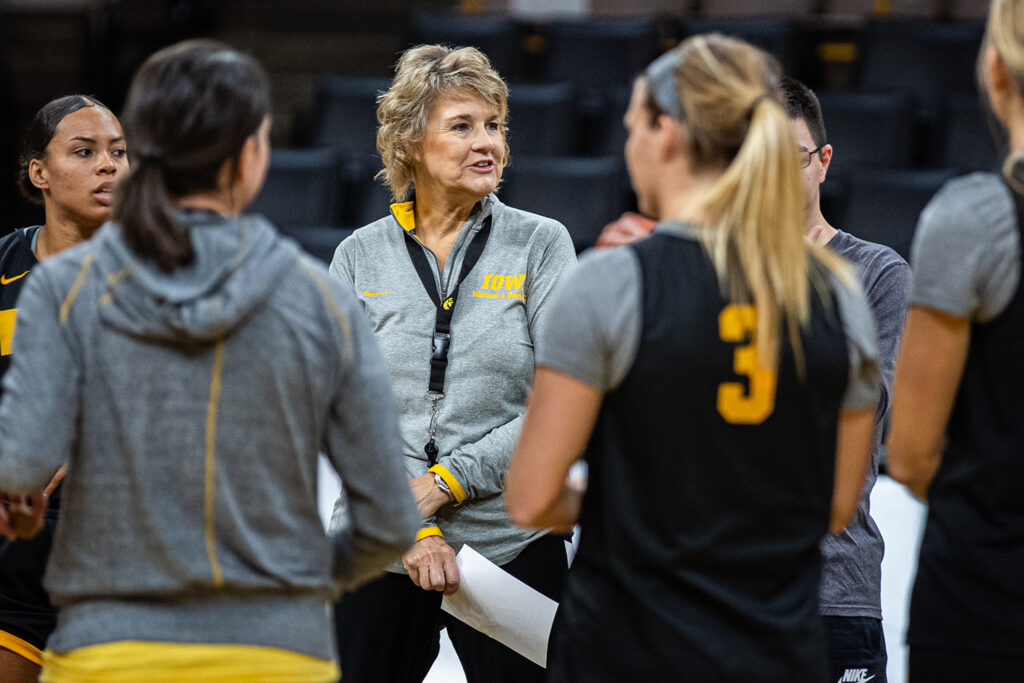THE IOWA WOMENS BASKETBALL TEAM SIGN A REPLACEMENT FOR…..

Iowa head coach Lisa Bluder leads a team huddle during an Iowa women's basketball practice at Carver-Hawkeye Arena on Thursday, Oct. 24, 2019. (Shivansh Ahuja/The Daily Iowan)
A New Era for Iowa Basketball: Navigating the Transition with a Replacement Coach
The Iowa basketball team, a cornerstone of collegiate sports, faces a pivotal moment with the recent announcement of a new replacement coach. This transition marks the end of an era and the beginning of a new chapter, filled with both challenges and opportunities. This essay delves into the implications of this significant change, exploring the reasons behind the transition, the potential impact on the team, and the broader prospects for the Iowa basketball program.
The Need for Change
The departure of the previous coach, whether due to retirement, resignation, or other circumstances, often signals a time for reflection and strategic reevaluation. The decision to bring in a replacement coach is driven by the need to maintain continuity while injecting new energy and ideas into the program. For the Iowa basketball team, this change is likely motivated by a desire to build on past successes, address any shortcomings, and chart a course for future achievements.
The previous coach’s tenure, regardless of its successes and challenges, left a lasting impact on the team. However, the dynamic nature of sports requires continual adaptation and innovation. Bringing in a new coach offers an opportunity to reassess strategies, implement fresh approaches, and adapt to the evolving landscape of collegiate basketball.
Immediate Impact on the Team
The introduction of a new coach can have immediate and varied effects on the team. Firstly, there is often a period of adjustment as players acclimate to new leadership styles, coaching philosophies, and training regimens. This transition can be both exciting and daunting, as players must adapt to different expectations and methodologies.
A replacement coach brings a fresh perspective, potentially revitalizing the team’s approach to both practice and competition. This can lead to immediate improvements in performance, as players are motivated to prove themselves and align with the new coach’s vision. However, it can also pose challenges, particularly if the new strategies differ significantly from those of the previous coach.
Moreover, team morale and cohesion are crucial during this period. Effective communication and strong leadership from the new coach can help maintain a positive atmosphere, fostering a sense of unity and purpose. Ensuring that players feel supported and valued throughout the transition is essential for sustaining performance and achieving success.
Broader Implications for the Program
The appointment of a replacement coach has broader implications for the Iowa basketball program. From a recruitment standpoint, the new coach’s reputation and vision can significantly influence the program’s attractiveness to prospective players. A well-regarded coach with a clear and compelling strategy can enhance the program’s appeal, helping to attract top-tier talent and build a strong, competitive roster.
The new coach’s leadership will also shape the program’s culture and identity. Their approach to teamwork, discipline, and player development will influence not only the current team but also future generations of players. Establishing a positive and supportive culture that prioritizes both athletic and personal growth is key to the long-term success of the program.
Furthermore, the transition offers an opportunity for the Iowa basketball community, including alumni, fans, and university stakeholders, to rally around the team. Unified support can provide a stable foundation for the new coach and the players, reinforcing a sense of continuity and commitment to the program’s values and goals.
Strategic Steps Forward
Navigating the transition effectively requires a strategic and thoughtful approach. Firstly, it is crucial to facilitate open communication between the new coach, players, and the broader basketball community. Transparent discussions about goals, expectations, and changes can help ease the adjustment period and build trust.
Secondly, leveraging the strengths and experiences of the new coach can drive immediate improvements and long-term development. This involves integrating the coach’s innovative strategies while respecting the team’s existing strengths and traditions.
Investing in player development is another critical focus. Ensuring that players have access to the resources, training, and support they need to thrive under new leadership will contribute to the team’s success. This includes both on-court training and off-court mentorship, promoting holistic development.
Conclusion
The Iowa basketball team’s transition to a new coach marks a significant and transformative moment in its history. While change often brings challenges, it also offers opportunities for growth, innovation, and renewed success. By embracing the new coach’s vision, maintaining strong communication, and fostering a supportive team culture, the Iowa basketball program can navigate this transition effectively and continue to thrive in the competitive arena of collegiate sports. The future holds promise, and with the right strategies and collective effort, the Iowa basketball team can achieve new heights and build a lasting legacy.









Thanks for sharing. I read many of your blog posts, cool, your blog is very good.